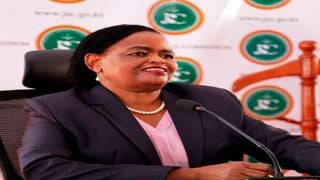
Justice Martha Koome during her interview for the position of Chief Justice on April 14, 2021.
| Jeff Angote | Nation Media GroupNews
Premium
From child rights advocate to top judge in Kenya
What you need to know:
- Justice Koome will be the President of the Supreme Court and the chairperson of the JSC.
- The judge comes from a humble, polygamous family of 18 children.
For the first time in Kenya, an arm of the government will be headed by a woman, following one of the most progressive moves by the Judicial Service Commission (JSC) in nominating Court of Appeal judge Martha Karambu Koome as Chief Justice.
Second time is the charm for Justice Koome, who unsuccessfully sought to replace retired Chief Justice Willy Mutunga in 2016.
Justice David Kenani Maraga emerged best then, and his January 12, 2021 retirement opened the door for one of the most anticipated races outside the Presidential election.
In addition to being Chief Justice if President Uhuru Kenyatta accepts her nomination, Justice Koome will also be the President of the Supreme Court and the chairperson of the JSC.
While the legal professional of 33 years is accustomed to making strides in a patriarchal society where gender beats down brilliance, Justice Koome’s nomination has thrust her into a league of her own.
Despite the drawbacks of coming from a humble, polygamous family of 18 children, the judge and excellence have walked a steady path for 61 years and beaten many an odd along the way to becoming one of the most courageous and brilliant legal minds in Kenya.
At Mugoiri Girls High School, she started leaving footprints of excellence as she topped the class of 1980 to earn an admission to the University of Nairobi’s law faculty.
In 1986, Martha Koome became the second person from Kithiu village in Meru county to attain a university degree. Her elder sister had earlier graduated with a degree in Education.
As tough as nails
After graduating from the Kenya School of Law – a requirement for anyone looking to practice law in Kenya – she was gazetted as an advocate of the High Court.
In 1988, the young lawyer secured her first job at Mathenge & Muchemi Advocates, owned by G.K. Mathenge and Wanjuki Muchemi.
At the time, advocates had to practise for five years at a law firm before they could set up their companies.
And at the five-year mark, Martha Koome & Company Advocates was registered.
She joined the International Federation of Women Lawyers in Kenya (Fida) shortly after being listed as an advocate.
That was the period activist institutions bore the brunt of a brutal regime.
At Fida, it became apparent that the lawyer was as tough as nails, often standing up against oppressors who many a time were government bureaucrats.
After being elected Fida chairperson, the lawyer took on the government when it tormented critics like Raila Odinga, George Moseti Anyona and Kenneth Matiba.
Law practice and activism
She took on the Mungiki sect when it threatened to circumcise women in central Kenya.
Between 1994 and 1996 she was the first treasurer of the East African Law Society. A year before completing her East Africa Law Society term, she was appointed Commissioner to the African Committee on the Rights and Welfare of Children.
After 15 years of law practice and activism, the lawyer joined the Judiciary after the retirement of President Daniel arap Moi.
It was a time of hope. Her record informed the decision by President Mwai Kibaki to introduce Justice Koome to the Judiciary.
In 2012, Justice Koome was elevated to the Court of Appeal.
She had in the same year become the first of several judges to agree to public vetting, following requirements in the new Constitution aimed at weeding out rogue and lazy judicial officers.
The mother of three is passionate about children’s rights and has done a lot in developing laws to protect minors.
Last year, the judge was named the United Nations Person of the Year for fighting for children’s rights.
Controversial decision
“I recognise that children are vulnerable due to their age. I also recognise when they are in conflict with the law or they are victims of offences, it is because of a failure of a system. The society, family and community has failed them. That makes children victims,” Justice Koome told the Business Daily in a past interview.
The judge has handled hundreds of cases, but is most known for dissenting the extension of the initial 2012 General Election date, allowing the Communications Authority of Kenya to use a controversial mobile phone monitoring device in 2020.
But perhaps the most controversial decision Justice Koome participated in saw the Court of Appeal allow the October 26, 2017 repeat presidential election.
The High Court had declared that officials were irregularly hired for the vote that was called after President Uhuru’s election was annulled by the Supreme Court.
Justice Koome sat alongside colleagues Erastus Githinji and Fatuma Sichale outside official working hours and without permission from the Chief Justice as required by the law, and quashed the High Court decision.
During her five-hour interview with the JSC on Wednesday last week, Justice Koome threw the ball back to her former boss and current Attorney-General Paul Kihara Kariuki, by insisting that the three judges acted on his orders.
“I was directed by the then president of the Court of Appeal to hear the application for stay past working hours. My supervisor (as Court of Appeal judge) is the President of the Court,” she told the interviewing panel.
“If he has empanelled a bench and I am part of it, it would have been insubordination if I said I would not come. When I came to the court and read the file, I saw that the best thing was to avoid a constitutional crisis. I saw the country going into darkness if we did not grant the orders (the Independent Electoral and Boundaries Commission) sought.”





